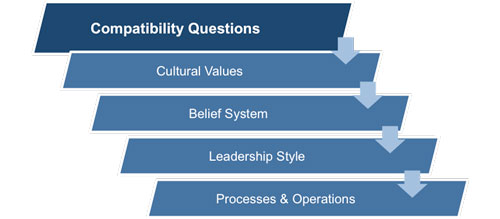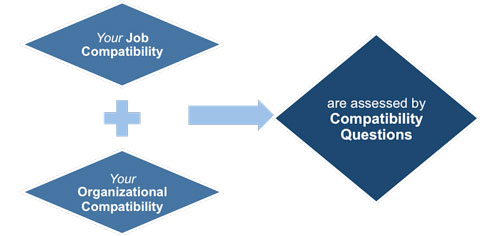Compatibility Questions
These questions can be the deciding factor when organizations need to select one person from several equally qualified individuals.
 |
Organizations need people who will seamlessly fit into their culture, ethos, and operations. Therefore it is important that your answers assure an interviewer that you are a perfect fit with the organization's:
• Culture and image
• Values and belief system
• Operational processes
• Leadership.
The more senior the role, the more important it is that candidates have a close fit with the organization's ethos and mission. These questions provide you with an opportunity to gauge how comfortable you would be working within the culture of the organization. Actively listening to everything the interviewer says can give you an indication of what to expect if you worked there.
There is unlikely to a 'perfect fit' between your values and those required, so you will need to make a value judgment as to whether or not you are going to be comfortable with the management style and belief system. However, there is no need to do this during the interview and it is something you can think about later. The best approach is to give all of your attention to answering the questions you are asked with the aim of showing how you would quickly and seamlessly fit into the organization. The research you have done in your interview preparation should give you a broad understanding of how you will be expected to manage your team, delegate tasks, and interact with other teams.
 |
You can use compatibility questions to demonstrate that you understand the organization's position in the marketplace and how it plans to develop using the information that you have gathered during your preparation. Some examples of the type of compatibility questions you may be asked to answer are:
How do you see yourself fitting into the management team?
Answer this by giving examples of how you have fitted into teams. Both work- and sports-related examples can be used to illustrate your past success in this area. Be sure to emphasize that your addition to the team was not disruptive and describe how you were able to add value in terms of performance.
How easily are you able to adapt to a new environment?
Describe a situation that illustrates how you have adapted to change and explain the strategies you have used. Be careful to describe your current organization in positive terms and to make it clear that you find change painless.
'Whilst I have been at ABC for nearly ten years, within that time I have made several successful moves between its divisions and worked in several locations. Having a flexible and open mind has enabled me to communicate easily with a new team and to quickly become a productive member.'
How do you go about getting to know new work colleagues?
You should select examples that illustrate your flexibility and adaptability but most importantly your ability to listen and observe the internal and external interactions of the group.
Where do you see yourself in five years' time?
Your answer needs to express your ambitions in a structured and realistic way taking account of the job you are applying for and what you know of the organization's structure. If there is anything about the latter that you are unclear about then this is a good opportunity to ask about it. Your interviewer could be your future boss or someone in a position to influence your career within the organization.
'In five years' time I would like to be chasing a director or partner's role as I will then be in a position to add considerable value to ABC.'
The answers you give to compatibility questions are designed to assess how well you and the organization could work together for mutual benefit. This is assessed in terms of how suited to the role you are, and how closely your own values match those of the organization.
As well as the generic compatibility questions above, you may be asked some very specific ones about how you would behave in certain hypothetical circumstances. You need to pay particular attention to these types of question as they can indicate areas where the organization's real values are different to those they are happy to publicize.
You may also be interested in:
Interview Questions | Interview Behavior | Capability Questions | Commitment Questions | Compatibility Questions | Questions About Your Self-Image | Questions About Your Application | Questions You Should Ask.


